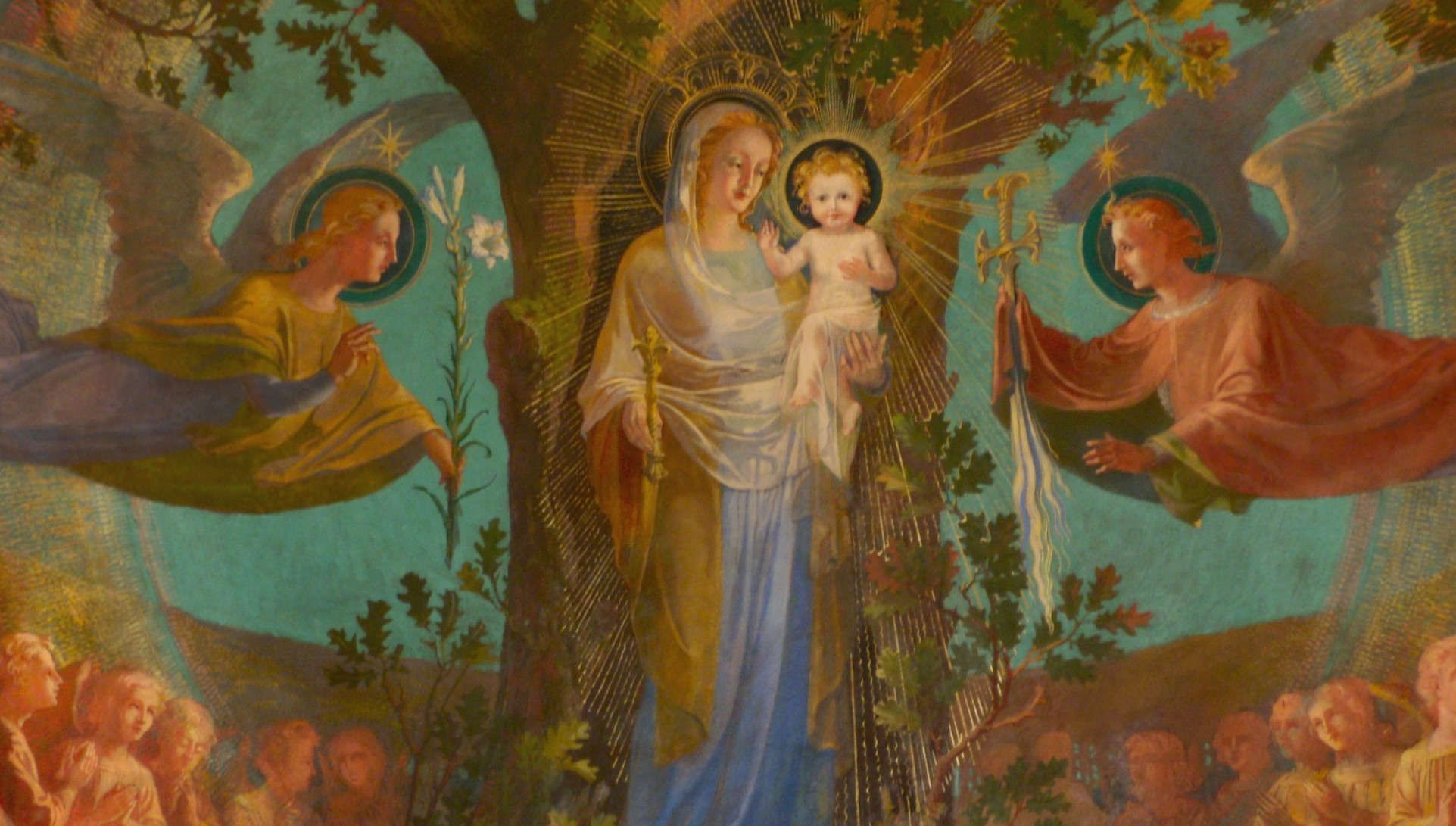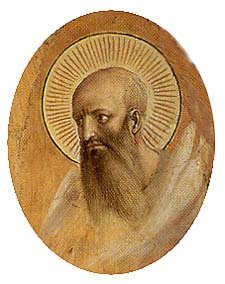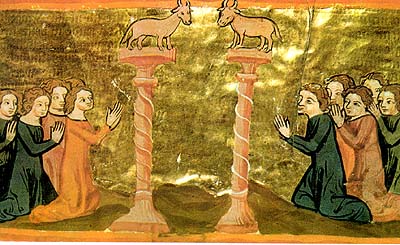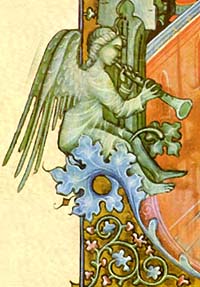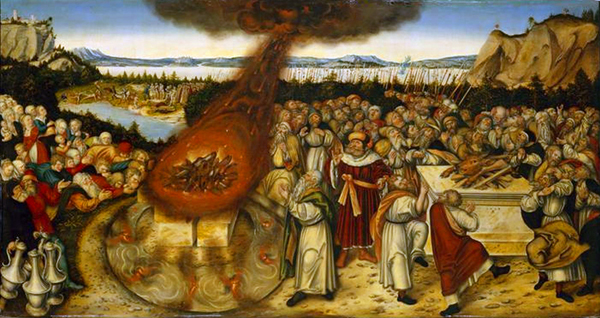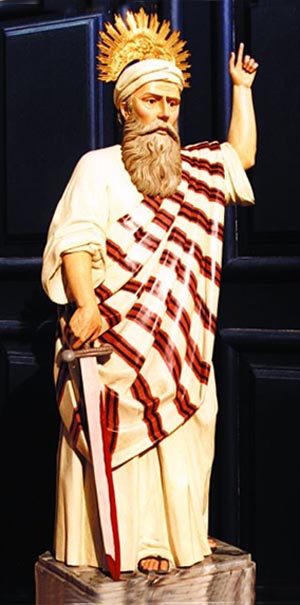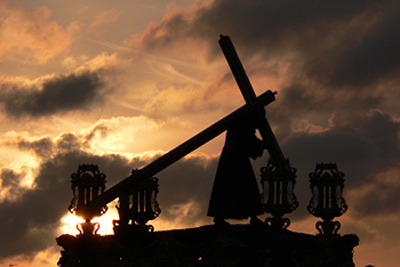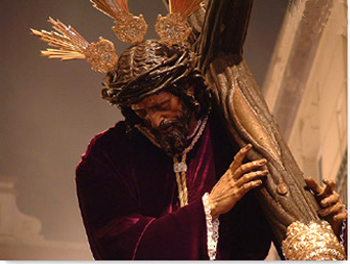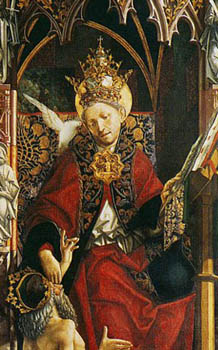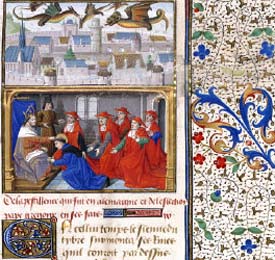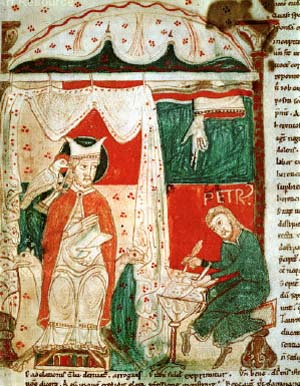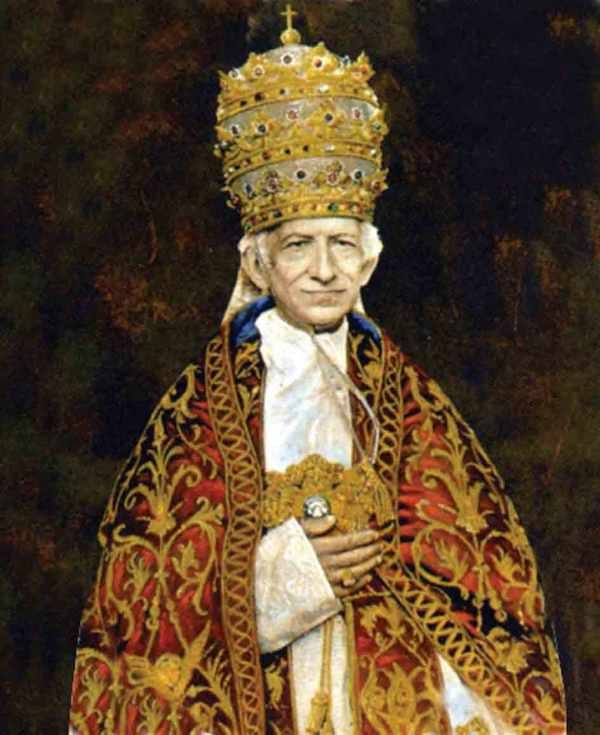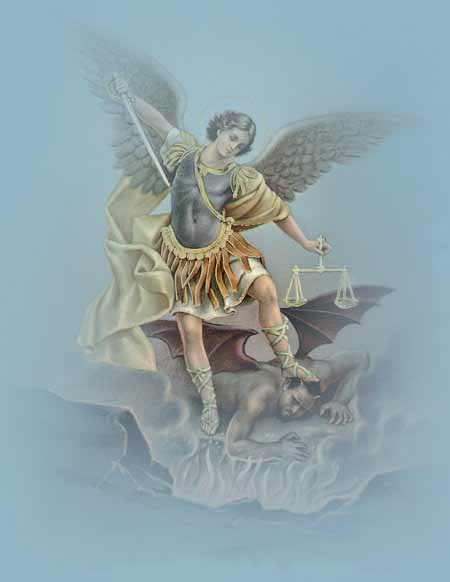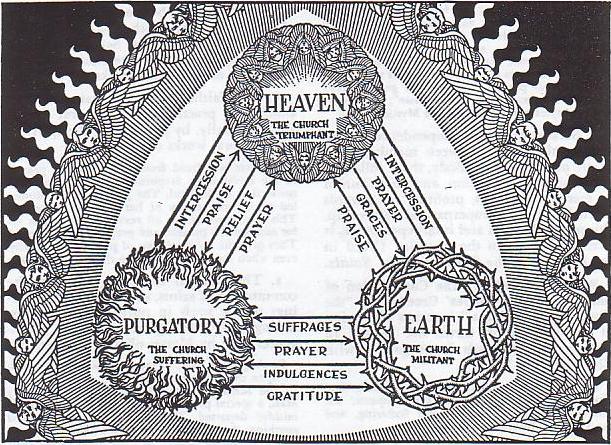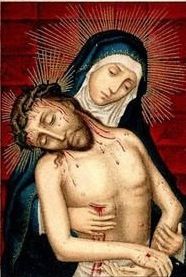Encyclical of Pope Leo XIII promulgated on January 22, 1899.
To Our Beloved Son, James Cardinal Gibbons, Cardinal Priest of the Title Sancta Maria, Beyond the Tiber, Archbishop of Baltimore:
LEO XIII, Pope-Beloved Son, Health and Apostolic Blessing: We send to you by this letter a renewed expression of that good will which we have not failed during the course of our pontificate to manifest frequently to you and to your colleagues in the episcopate and to the whole American people, availing ourselves of every opportunity offered us by the progress of your church or whatever you have done for safeguarding and promoting Catholic interests. Moreover, we have often considered and admired the noble gifts of your nation which enable the American people to be alive to every good work which promotes the good of humanity and the splendor of civilization. Although this letter is not intended, as preceding ones, to repeat the words of praise so often spoken, but rather to call attention to some things to be avoided and corrected; still because it is conceived in that same spirit of apostolic charity which has inspired all our letters, we shall expect that you will take it as another proof of our love; the more so because it is intended to suppress certain contentions which have arisen lately among you to the detriment of the peace of many souls.
It is known to you, beloved son, that the biography of Isaac Thomas Hecker, especially through the action of those who under took to translate or interpret it in a foreign language, has excited not a little controversy, on account of certain opinions brought forward concerning the way of leading Christian life.
We, therefore, on account of our apostolic office, having to guard the integrity of the faith and the security of the faithful, are desirous of writing to you more at length concerning this whole matter.
The underlying principle of these new opinions is that, in order to more easily attract those who differ from her, the Church should shape her teachings more in accord with the spirit of the age and relax some of her ancient severity and make some concessions to new opinions. Many think that these concessions should be made not only in regard to ways of living, but even in regard to doctrines which belong to the deposit of the faith. They contend that it would be opportune, in order to gain those who differ from us, to omit certain points of her teaching which are of lesser importance, and to tone down the meaning which the Church has always attached to them. It does not need many words, beloved son, to prove the falsity of these ideas if the nature and origin of the doctrine which the Church proposes are recalled to mind. The Vatican Council says concerning this point: “For the doctrine of faith which God has revealed has not been proposed, like a philosophical invention to be perfected by human ingenuity, but has been delivered as a divine deposit to the Spouse of Christ to be faithfully kept and infallibly declared. Hence that meaning of the sacred dogmas is perpetually to be retained which our Holy Mother, the Church, has once declared, nor is that meaning ever to be departed from under the pretense or pretext of a deeper comprehension of them.” -Constitutio de Fide Catholica, Chapter iv.
We cannot consider as altogether blameless the silence which purposely leads to the omission or neglect of some of the principles of Christian doctrine, for all the principles come from the same Author and Master, “the Only Begotten Son, Who is in the bosom of the Father.”-John i, I8. They are adapted to all times and all nations, as is clearly seen from the words of our Lord to His apostles: “Going, therefore, teach all nations; teaching them to observe all things whatsoever I have commanded you, and behold, I am with you all days, even to the end of the world.”-Matt. xxviii, 19. Concerning this point the Vatican Council says: “All those things are to be believed with divine and catholic faith which are contained in the Word of God, written or handed down, and which the Church, either by a solemn judgment or by her ordinary and universal magisterium, proposes for belief as having been divinely revealed.”-Const. de fide, Chapter iii.
Let it be far from anyone’s mind to suppress for any reason any doctrine that has been handed down. Such a policy would tend rather to separate Catholics from the Church than to bring in those who differ. There is nothing closer to our heart than to have those who are separated from the fold of Christ return to it, but in no other way than the way pointed out by Christ.
The rule of life laid down for Catholics is not of such a nature that it cannot accommodate itself to the exigencies of various times and places. (VOL. XXIV-13.) The Church has, guided by her Divine Master, a kind and merciful spirit, for which reason from the very beginning she has been what St. Paul said of himself: “I became all things to all men that I might save all.”
History proves clearly that the Apostolic See, to which has been entrusted the mission not only of teaching but of governing the whole Church, has continued “in one and the same doctrine, one and the same sense, and one and the same judgment,” — Const. de fide, Chapter iv.
But in regard to ways of living she has been accustomed to so yield that, the divine principle of morals being kept intact, she has never neglected to accommodate herself to the character and genius of the nations which she embraces.
Who can doubt that she will act in this same spirit again if the salvation of souls requires it? In this matter the Church must be the judge, not private men who are often deceived by the appearance of right. In this, all who wish to escape the blame of our predecessor, Pius the Sixth, must concur. He condemned as injurious to the Church and the spirit of God who guides her the doctrine contained in proposition lxxviii of the Synod of Pistoia, “that the discipline made and approved by the Church should be submitted to examination, as if the Church could frame a code of laws useless or heavier than human liberty can bear.”
But, beloved son, in this present matter of which we are speaking, there is even a greater danger and a more manifest opposition to Catholic doctrine and discipline in that opinion of the lovers of novelty, according to which they hold such liberty should be allowed in the Church, that her supervision and watchfulness being in some sense lessened, allowance be granted the faithful, each one to follow out more freely the leading of his own mind and the trend of his own proper activity. They are of opinion that such liberty has its counterpart in the newly given civil freedom which is now the right and the foundation of almost every secular state.
In the apostolic letters concerning the constitution of states, addressed by us to the bishops of the whole Church, we discussed this point at length; and there set forth the difference existing between the Church, which is a divine society, and all other social human organizations which depend simply on free will and choice of men.
It is well, then, to particularly direct attention to the opinion which serves as the argument in behalf of this greater liberty sought for and recommended to Catholics.
It is alleged that now the Vatican decree concerning the infallible teaching authority of the Roman Pontiff having been proclaimed that nothing further on that score can give any solicitude, and accordingly, since that has been safeguarded and put beyond question a wider and freer field both for thought and action lies open to each one. But such reasoning is evidently faulty, since, if we are to come to any conclusion from the infallible teaching authority of the Church, it should rather be that no one should wish to depart from it, and moreover that the minds of all being leavened and directed thereby, greater security from private error would be enjoyed by all. And further, those who avail themselves of such a way of reasoning seem to depart seriously from the over-ruling wisdom of the Most High-which wisdom, since it was pleased to set forth by most solemn decision the authority and supreme teaching rights of this Apostolic See-willed that decision precisely in order to safeguard the minds of the Church’s children from the dangers of these present times.
These dangers, viz., the confounding of license with liberty, the passion for discussing and pouring contempt upon any possible subject, the assumed right to hold whatever opinions one pleases upon any subject and to set them forth in print to the world, have so wrapped minds in darkness that there is now a greater need of the Church’s teaching office than ever before, lest people become unmindful both of conscience and of duty.
We, indeed, have no thought of rejecting everything that modern industry and study has produced; so far from it that we welcome to the patrimony of truth and to an ever-widening scope of public well-being whatsoever helps toward the progress of learning and virtue. Yet all this, to be of any solid benefit, nay, to have a real existence and growth, can only be on the condition of recognizing the wisdom and authority of the Church.
Coming now to speak of the conclusions which have been deduced from the above opinions, and for them, we readily believe there was no thought of wrong or guile, yet the things themselves certainly merit some degree of suspicion. First, all external guidance is set aside for those souls who are striving after Christian perfection as being superfluous or indeed, not useful in any sense -the contention being that the Holy Spirit pours richer and more abundant graces than formerly upon the souls of the faithful, so that without human intervention He teaches and guides them by some hidden instinct of His own. Yet it is the sign of no small over-confidence to desire to measure and determine the mode of the Divine communication to mankind, since it wholly depends upon His own good pleasure, and He is a most generous dispenser ‘of his own gifts. “The Spirit breatheth whereso He listeth.” — John iii, 8.
“And to each one of us grace is given according to the measure of the giving of Christ.” — Eph. iv, 7.
And shall any one who recalls the history of the apostles, the faith of the nascent church, the trials and deaths of the martyrs- and, above all, those olden times, so fruitful in saints-dare to measure our age with these, or affirm that they received less of the divine outpouring from the Spirit of Holiness? Not to dwell upon this point, there is no one who calls in question the truth that the Holy Spirit does work by a secret descent into the souls of the just and that He stirs them alike by warnings and impulses, since unless this were the case all outward defense and authority would be unavailing. “For if any persuades himself that he can give assent to saving, that is, to gospel truth when proclaimed, without any illumination of the Holy Spirit, who give’s unto all sweetness both to assent and to hold, such an one is deceived by a heretical spirit.”-From the Second Council of Orange, Canon 7.
Moreover, as experience shows, these monitions and impulses of the Holy Spirit are for the most part felt through the medium of the aid and light of an external teaching authority. To quote St. Augustine. “He (the Holy Spirit) co-operates to the fruit gathered from the good trees, since He externally waters and cultivates them by the outward ministry of men, and yet of Himself bestows the inward increase.”-De Gratia Christi, Chapter xix. This, indeed, belongs to the ordinary law of God’s loving providence that as He has decreed that men for the most part shall be saved by the ministry also of men, so has He wished that those whom He calls to the higher planes of holiness should be led thereto by men; hence St. Chrysostom declares we are taught of God through the instrumentality of men.-Homily I in Inscrib. Altar. Of this a striking example is given us in the very first days of the Church.
For though Saul, intent upon blood and slaughter, had heard the voice of our Lord Himself and had asked, “What dost Thou wish me to do?” yet he was bidden to enter Damascus and search for Ananias. Acts ix: “Enter the city and it shall be there told to thee what thou must do.”
Nor can we leave out of consideration the truth that those who are striving after perfection, since by that fact they walk in no beaten or well-known path, are the most liable to stray, and hence have greater need than others of a teacher and guide. Such guidance has ever obtained in the Church; it has been the universal teaching of those who throughout the ages have been eminent for wisdom and sanctity-and hence to reject it would be to commit one’s self to a belief at once rash and dangerous.
A thorough consideration of this point, in the supposition that no exterior guide is granted such souls, will make us see the difficulty of locating or determining the direction and application of that more abundant influx of the Holy Spirit so greatly extolled by innovators To practice virtue there is absolute need of the assistance of the Holy Spirit, yet we find those who are fond of novelty giving an unwarranted importance to the natural virtues, as though they better responded to the customs and necessities of the times and that having these as his outfit man becomes more ready to act and more strenous in action. It is not easy to understand how persons possessed of Christian wisdom can either prefer natural to supernatural virtues or attribute to them a greater efficacy and fruifulness. Can it be that nature conjoined with grace is weaker than when left to herself?
Can it be that those men illustrious for sanctity, whom the Church distinguishes and openly pays homage to, were deficient, came short in the order of nature and its endowments, because they excelled in Christian strength? And although it be allowed at times to wonder at acts worthy of admiration which are the outcome of natural virtue-is there anyone at all endowed simply with an outfit of natural virtue? Is there any one not tried by mental anxiety, and this in no light degree? Yet ever to master such, as also to preserve in its entirety the law of the natural order, requires an assistance from on high These single notable acts to which we have alluded will frequently upon a closer investigation be found to exhibit the appearance rather than the reality of virtue. Grant that it is virtue, unless we would “run in vain” and be unmindful of that eternal bliss which a good God in his mercy has destined for us, of what avail are natural virtues unless seconded by the gift of divine grace? Hence St. Augustine well says: “Wonderful is the strength, and swift the course, but outside the true path.” For as the nature of man, owing to the primal fault, is inclined to evil and dishonor, yet by the help of grace is raised up, is borne along with a new greatness and strength, so, too, virtue, which is not the product of nature alone, but of grace also, is made fruitful unto everlasting life and takes on a more strong and abiding character.
This overesteem of natural virtue finds a method of expression in assuming to divide all virtues in active and passive, and it is alleged that whereas passive virtues found better place in past times, our age is to be characterized by the active. That such a division and distinction cannot be maintained is patent-for there is not, nor can there be, merely passive virtue. “Virtue,” says St. Thomas Aquinas, “designates the perfection of some faculty, but end of such faculty is an act, and an act of virtue is naught else than the good use of free will,” acting, that is to say, under the grace of God if the act be one of supernatural virtue.
He alone could wish that some Christian virtues be adapted to certain times and different ones for other times who is unmindful of the apostle’s words: “That those whom He foreknew, He predestined to be made conformable to the image of His Son.”- Romans viii, 29. Christ is the teacher and the exemplar of all sanctity, and to His standard must all those conform who wish for eternal life. Nor does Christ know any change as the ages pass, “for He is yesterday and to-day and the same forever.”-Hebrews xiii, 8. To the men of all ages was the precept given: “Learn of Me, because I am meek and humble of heart.”-Matt. xi, 29.
To every age has He been made manifest to us as obedient even unto death; in every age the apostle’s dictum has its force: “Those who are Christ’s have crucified their flesh with its vices and concupiscences.” Would to God that more nowadays practiced these virtues in the degree of the saints of past times, who in humility, obedience and self-restraint were powerful “in word and in deed” -to the great advantage not only of religion, but of the state and the public welfare.
From this disregard of the – angelical virtues, erroneously styled passive, the step was a short one to a contempt of the religious life which has in some degree taken hold of minds. That such a value is generally held by the upholders of new views, we infer from certain statements concerning the vows which religious orders take. They say vows are alien to the spirit of our times, in that they limit the bounds of human liberty; that they are more suitable to weak than ›o strong minds; that so far from making for human perfection and the good of human organization, they are hurtful to both; but that this is as false as possible from the practice and the doctrine of the Church is clear, since she has always given the very highest approval to the religious method of life; nor without good cause, for those who under the divine call have freely embraced that state of life did not content themselves with the observance of precepts, but, going forward to the evangelical counsels, showed themselves ready and valiant soldiers of Christ. Shall we judge this to be a characteristic of weak minds, or shall we say that it is useless or hurtful to a more perfect state of life?
Those who so bind themselves by the vows of religion, far from having suffered a loss of liberty, enjoy that fuller and freer kind, that liberty, namely, by which Christ hath made us free. And this further view of theirs, namely, that the religious life is either entirely useless or of little service to the Church, besides being injurious to the religious orders cannot be the opinion of anyone who has read the annals of the Church. Did not your country, the United States, derive the beginnings both of faith and of culture from the children of these religious families? to one of whom but very lately, a thing greatly to your praise, you have decreed that a statue be publicly erected. And even at the present time wherever the religious families are found, how speedy and yet how fruitful a harvest of good works do they not bring forth! How very many leave home and seek strange lands to impart the truth of the gospel and to widen the bounds of civilization; and this they do with the greatest cheerfulness amid manifold dangers! Out of their number not less, indeed, than from the rest of the clergy, the Christian world finds the preachers of God’s word, the directors of conscience, the teachers of youth and the Church itself the examples of all sanctity.
Nor should any difference of praise be made between those who follow the active state of life and those others who, charmed with solitude, give themselves to prayer and bodily mortification. And how much, indeed, of good report these have merited, and do merit, is known surely to all who do not forget that the “continual prayer of the just man” avails to placate and to bring down the blessings of heaven when to such prayers bodily mortification is added.
But if there be those who prefer to form one body without the obligation of the vows let them pursue such a course. It is not new in the Church, nor in any wise censurable. Let them be careful, however, not to set forth such a state above that of religious orders. But rather, since mankind are more disposed at the present time to indulge themselves in pleasures, let those be held in greater esteem “who having left all things have followed Christ.”
Finally, not to delay too long, it is stated that the way and method hitherto in use among Catholics for bringing back those who have fallen away from the Church should be left aside and another one chosen, in which matter it will suffice to note that it is not the part of prudence to neglect that which antiquity in its long experience has approved and which is also taught by apostolic authority. The scriptures teach us that it is the duty of all to be solicitous for the salvation of one’s neighbor, according to the power and position of each. The faithful do this by religiously discharging the duties of their state of life, by the uprightness of their conduct, by their works of Christian charity and by earnest and continuous prayer to God. On the other hand, those who belong to the clergy should do this by an enlightened fulfillment of their preaching ministry, by the pomp and splendor of ceremonies especially by setting forth that sound form of doctrine which Saint Paul inculcated upon Titus and Timothy. But if, among the different ways of preaching the word of God that one sometimes seems to be preferable, which directed to non-Catholics, not in churches, but in some suitable place, in such wise that controversy is not sought, but friendly conference, such a method is certainly without fault. But let those who undertake such ministry be set apart by the authority of the bishops and let them be men whose science and virtue has been previously ascertained. For we think that there are many in your country who are separated from Catholic truth more by ignorance than by ill-will, who might perchance more easily be drawn to the one fold of Christ if this truth be set forth to them in a friendly and familiar way.
From the foregoing it is manifest, beloved son, that we are not able to give approval to those views which, in their collective sense, are called by some “Americanism.” But if by this name are to be understood certain endowments of mind which belong to the American people, just as other characteristics belong to various other nations, and if, moreover, by it is designated your political condition and the laws and customs by which you are governed, there is no reason to take exception to the name. But if this is to be so understood that the doctrines which have been adverted to above are not only indicated, but exalted, there can be no manner of doubt that our venerable brethren, the bishops of America, would be the first to repudiate and condemn it as being most injurious to themselves and to their country. For it would give rise to the suspicion that there are among you some who conceive and would have the Church in America to be different from what it is in the rest of the world.
But the true church is one, as by unity of doctrine, so by unity of government, and she is catholic also. Since God has placed the center and foundation of unity in the chair of Blessed Peter, she is rightly called the Roman Church, for “where Peter is, there is the church.” Wherefore, if anybody wishes to be considered a real Catholic, he ought to be able to say from his heart the selfsame words which Jerome addressed to Pope Damasus: “I, acknowledging no other leader than Christ, am bound in fellowship with Your Holiness; that is, with the chair of Peter. I know that the church was built upon him as its rock, and that whosoever gathereth not with you, scattereth.”
We having thought it fitting, beloved son, in view of your high office, that this letter should be addressed specially to you. It will also be our care to see that copies are sent to the bishops of the United States, testifying again that love by which we embrace your whole country, a country which in past times has done so much for the cause of religion, and which will by the Divine assistance continue to do still greater things. To you, and to all the faithful of America, we grant most lovingly, as a pledge of Divine assistance, our apostolic benediction.
Given at Rome, from St. Peter’s, the 22nd day of January, 1899, and the thirty-first of our pontificate.
Leo XIII
